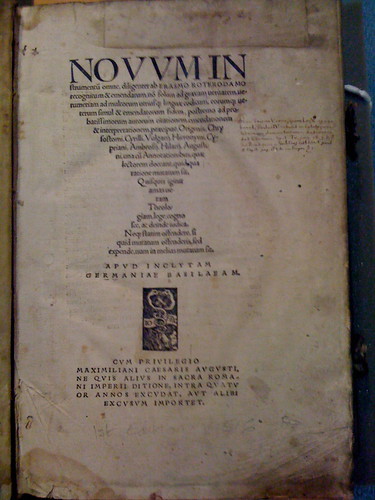[As part of writing out a book on exegetical method — the approaches, the how-to parts, the consequences parts, and so on — I’m beginning with some introductory writing on the subject. This will probably grow into a first chapter, perhaps with my earlier posts on “What Makes Exegesis Difficult?” At any rate, this is what I think, not my fully researched and documented formal conclusions.]
“Exegetical method” sounds as though it should be straightforward. Do this, then this, remember that, and poof! That’s exegesis. To a certain extent, I imagine that students expect that as well; they have learned to make scrambled eggs, to knit scarves, to pitch a tent, to drive an auto. Now, teach us the method for producing exegesis. Likewise, non-practitioners may imagine that appropriate method lies behind our confidently announced interpretations. Merely indicating the topic suggests that there is a thing called exegetical method, that it lies behind the process of what can rightly be called “exegesis,” and that somebody who cares to practice exegesis should learn the method, and then be equipped to deliver the goods.

Many books about exegesis and method underscore this premise by setting out a series of steps for conducting exegesis. The number and order of these steps vary, but they express the sense that by doing identifiable things in an appropriate process, the results will be — if not always correct or even sound — at least exegetical. Student preachers and adult ed leaders very often refer to “my exegesis of X or Y” (even some experienced leaders do so), with the attendant connotation of interpretive authority. They have performed the steps they were taught, and have arrived at this interpretive result. That’s exegesis.
At the same time, some voices have called this model into question. In lectures at Yale Divinity School, Brevard Childs occasionally referred to “the thirty-three exegetical steps for beating a text into a pulp.” And obviously, not every student who follows the thirty-three, or ten, or twelve, or sixteen steps does so successfully; some students receive high marks, others low marks. If a student receives a low mark, but follows all the designated steps, has she still practiced warranted, authoritative “exegesis”? What is the difference between “good exegesis,” “bad exegesis,” and “not exegesis”?
In order to understand such questions, and thereby to understand what subsequent entries will say about exegetical method, we ought to work toward an understanding of what people mean by “exegesis,” what people want exegesis for, and how we can reasonably expect to be understood when we (as practitioners of this craft) refer to our work as exegesis. No one benefits if we just state a stipulated definition that ordinary readers and listeners won’t recognise, and such artificial definitions increase the likelihood that we’ll be heard as making claims that differ from what we (in our stipulated sense of the term) would defend as what we really were up to. Similarly, if we ourselves are utterly convinced that we are doing something different from what any outsider can observe us to be doing, our definition of our practice may be defective. The more precisely we can name what we do, what that entails, how one could dispute or refute our claims, and why it matters, the more clear, open, honest, and reliable our public discourse will be.
Thus the question: what is exegetical method? The tradition of assigning series of steps that cumulatively lead to “exegesis” is honoured by time, by the authority of notable author-teachers who have promoted the idea, and by the apparent success of students who have learned exegesis by this way. Such warrants cannot lightly be dismissed. At the same time, some authorities (such as Childs) have called the tradition into question, and we can demonstrate certain drawbacks to both the premise and to its consequences among students who practice it.
[To be continued…]






